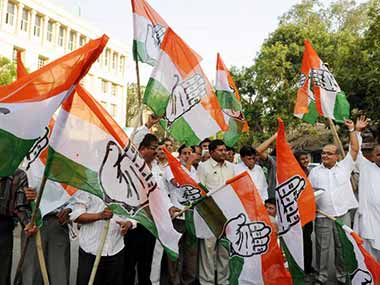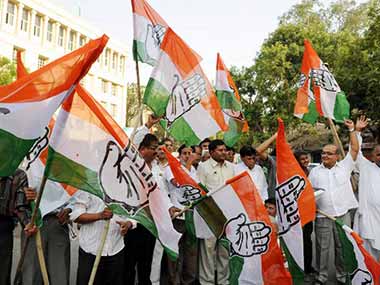The party was hoping to put up a close fight in the state like it did in Chhattisgarh. To regain its lost ground it needed to raise the level of its performance twice as high as in the 2008 elections. It wasn’t even half as good. The party floundered after arousing the expectations of the electorate. It couldn’t have got over four percent more votes (over the past elections) without that. A galvanised cadre under a new leader was expected to answer the voters’ demand. But the party’s internecine struggle put paid to any hopes of ending its decade-long exile from power. [caption id=“attachment_1298335” align=“alignleft” width=“380”]  AFP[/caption] It’s no longer so much about the eroding political base but the declining social acceptability that the Congress should be worried. Madhya Pradesh has been a bipolar state since after the Emergency. The Jan Sangh or its later avatar BJP has always been part of the social fabric ever since the formation of the state. The Congress leaders have done little in the recent years to check the BJP from luring away the Dalits and tribal voters. Former chief minister Digvijaya Singh had talked about Dalit agenda in 2003 but it remained on papers as he was ousted after 10 years in power. After 2008 the BJP substantially eroded the Congress’ base among Scheduled Tribes. One runs the risk of being repetitive while discussing Congress’ failures because the party has repeated the same mistakes over the years. There were many wake-up calls during the four by-elections that the party lost over the past two years. It preferred to keep pressing the snooze option. The party workers were so sure of riding back to power on the negative wave against BJP they started counting their chickens before they hatched. Mohan Prakash, who replaced the general secretary in charge of the state BK Hariprasad, had to first deflate their overconfidence. When he was introduced to the members in Bhopal, enthusiastic workers said the party had 66 members in a House of 230 and needed 50 to get to the magic figure. There was a sudden hush when Mohan Prakash asked how could anyone guarantee the victory of all 66 incumbents. In April, Rahul Gandhi initiated efforts to motivate the cadre and the response was clearly visible among the youth. There was, however, no concerted effort to consolidate those gains. The party kept promising that tickets would be distributed early so the candidates could get at least six weeks to campaign. Continued infighting delayed the nominations till the last date of withdrawal of papers. Till three months before the elections the Congress had no clarity on the state leadership and had very little to show by way of preparedness and strategic campaigning. The central leadership is too bewildered and dejected to come up with any cogent explanations for the debacle. It is also too preoccupied with the thoughts of securing the political future of Rahul Gandhi to review the disaster with a clear head. The campaign committee leader Jyotiraditya Scindia failed to measure up to the occasion and expectations. Insiders express reservations on whether an early decision to hand the reins to Scindia would have helped. “He has no trace of the popularity and efficiency of his father, Madhavrao Scindia,” says a Sewa Dal worker who visualised a turnaround when Jyotiraditya was named to lead the campaign. Digvijaya Singh, perhaps the last leader with a pan-Madhya Pradesh influence has consistently thwarted attempts to let other groups flourish. The central leadership compounded the problem by imposing rootless leaders like Suresh Pachauri who have never been needed to explain their failures. Pachauri has been accused of selling off party tickets. The Congress’ plans to mobilise National Students Union of India, Sewa Dal and Youth Congress members succeeded only partly. Vipin Wankhede state president of the NSUI says he expected a much closer contest as his organisation had spared no effort even at booth level to mobilise the voters. The membership of all these organisations in the state runs into nearly half a million. The state Youth Congress president Kunal Choudhury is guarded in his assessment. He feels the party left considerable scope for improvement in booth management and nomination of party candidates.
It’s no longer so much about the eroding political base but the declining social acceptability that the Congress should be worried about.
Advertisement
End of Article


)
)
)
)
)
)
)
)
)



